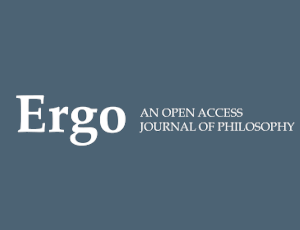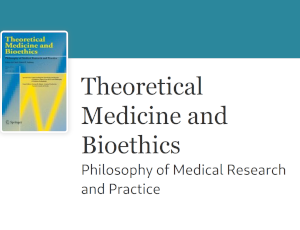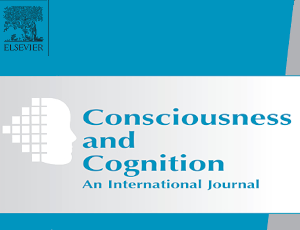 Widok zawartości stron
Widok zawartości stron
 Widok zawartości stron
Widok zawartości stron
Wyniki sortowane według etykiety: publication
publication biouncertainty
Half a Century of Bioethics and Philosophy of Medicine. A Topic-Modeling Study - nowy artykuł Piotra Bystranowskiego, Viliusa Dranseiki i Tomasza Żuradzkiego zaakceptowany do druku w czasopiśmie "Bioethics"
Topic modeling–a text-mining technique often used to uncover thematic structures in large collections of texts–has been increasingly frequently employed in the context of analysis of scholarly output. In this study, we construct a corpus of 19,488 texts published since 1971 in seven leading journals in the field of bioethics and philosophy of medicine and we fit a topic model, using the latent Dirichlet algorithm (K = 100).
więcej o Half a Century of Bioethics and Philosophy of Medicine. A Topic-Modeling Study - nowy artykuł Piotra Bystranowskiego, Viliusa Dranseiki i Tomasza Żuradzkiego zaakceptowany do druku w czasopiśmie "Bioethics"
publication biouncertainty
Is meta-analysis of RCTs assessing the efficacy of interventions a reliable source of evidence for therapeutic decisions? - nowy artykuł Mariusza Maziarza
Literature-based meta-analysis is a standard technique applied to pool results of individual studies used in medicine and social sciences. It has been criticized for being too malleable to constrain results, averaging incomparable values, lacking a measure of evidence's strength, and problems with a systematic bias of individual studies. We argue against using literature-based meta-analysis of RCTs to assess treatment efficacy and show that therapeutic decisions based on meta-analytic average are not optimal given the full scope of existing evidence.
więcej o Is meta-analysis of RCTs assessing the efficacy of interventions a reliable source of evidence for therapeutic decisions? - nowy artykuł Mariusza Maziarza
publication biouncertainty
Regret Averse Opinion Aggregation - nowa publikacja autorstwa Lee Elkina
It is often suggested that when opinions differ among individuals in a group, the opinions should be aggregated to form a compromise. This paper compares two approaches to aggregating opinions, linear pooling and what I call opinion agglomeration. In evaluating both strategies, I propose a pragmatic criterion, No Regrets, entailing that an aggregation strategy should prevent groups from buying and selling bets on events at prices regretted by their members.
więcej o Regret Averse Opinion Aggregation - nowa publikacja autorstwa Lee Elkina
publication biouncertainty
Experimental Philosophical Bioethics and Normative Inference - nowa publikacja współautorstwa Viliusa Dranseiki
This paper explores an emerging sub-field of both empirical bioethics and experimental philosophy, which has been called “experimental philosophical bioethics” (bioxphi). As an empirical discipline, bioxphi adopts the methods of experimental moral psychology and cognitive science; it does so to make sense of the eliciting factors and underlying cognitive processes that shape people’s moral judgments, particularly about real-world matters of bioethical concern.
więcej o Experimental Philosophical Bioethics and Normative Inference - nowa publikacja współautorstwa Viliusa Dranseiki
publication biouncertainty
Are observer memories (accurate) memories? Insights from experimental philosophy - nowy artykuł współautorstwa Viliusa Dranseiki
A striking feature of our memories of the personal past is that they involve different visual perspectives: one sometimes recalls past events from one’s original point of view (a field perspective), but one sometimes recalls them from an external point of view (an observer perspective). In philosophy, observer memories are often seen as being less than fully genuine and as being necessarily false or distorted. This paper looks at whether laypeople share the standard philosophical view by applying the methods of experimental philosophy.
więcej o Are observer memories (accurate) memories? Insights from experimental philosophy - nowy artykuł współautorstwa Viliusa Dranseiki
publication biouncertainty
The Precautionary Principle and Expert Disagreement - nowa publikacja autorstwa Lee Elkina
The Precautionary Principle is typically construed as a conservative decision rule aimed at preventing harm. But Martin Peterson has argued that the principle is better understood as an epistemic rule, guiding decision-makers in forming beliefs rather than choosing among possible acts. On the epistemic view, he claims there is a principle concerning expert disagreement underlying precautionary-based reasoning called the ecumenical principle.
więcej o The Precautionary Principle and Expert Disagreement - nowa publikacja autorstwa Lee Elkina
publication biouncertainty
Are There Cross-Cultural Legal Principles? Modal Reasoning Uncovers Procedural Constraints on Law - nowy artykuł współautorstwa Piotra Bystranowskiego i Viliusa Dranseiki
Despite pervasive variation in the content of laws, legal theorists and anthropologists have argued that laws share certain abstract features and even speculated that law may be a human universal. In the present report, we evaluate this thesis through an experiment administered in 11 different countries. Are there cross-cultural principles of law?
więcej o Are There Cross-Cultural Legal Principles? Modal Reasoning Uncovers Procedural Constraints on Law - nowy artykuł współautorstwa Piotra Bystranowskiego i Viliusa Dranseiki
publication biouncertainty
Do Formalist Judges Abide By Their Abstract Principles? A Two-Country Study in Adjudication - nowy artykuł współautorstwa Piotra Bystranowskiego
Recent literature in experimental philosophy has postulated the existence of the abstract/concrete paradox (ACP): the tendency to activate inconsistent intuitions (and generate inconsistent judgment) depending on whether a problem to be analyzed is framed in abstract terms or is described as a concrete case. One recent study supports the thesis that this effect influences judicial decision-making (...)
więcej o Do Formalist Judges Abide By Their Abstract Principles? A Two-Country Study in Adjudication - nowy artykuł współautorstwa Piotra Bystranowskiego
publication biouncertainty
Resolving empirical controversies with mechanistic evidence - nowy artykuł Mariusza Maziarza
The results of econometric modeling are fragile in the sense that minor changes in estimation techniques or sample can lead to statistical models that support inconsistent causal hypotheses. The fragility of econometric results undermines making conclusive inferences from the empirical literature. I argue that the program of evidential pluralism, which originated in the context of medicine and encapsulates to the normative reading of the Russo-Williamson Thesis that causal claims need the support of both difference-making and mechanistic evidence (...)
więcej o Resolving empirical controversies with mechanistic evidence - nowy artykuł Mariusza Maziarza
publication
Can I Feel Your Pain? The Biological and Socio-Cognitive Factors Shaping People’s Empathy with Social Robots - nowy artykuł Joanny Malinowskiej
This paper discuss the phenomenon of empathy in social robotics and is divided into three main parts. Initially, I analyse whether it is correct to use this concept to study and describe people’s reactions to robots. I present arguments in favour of the position that people actually do empathise with robots. I also consider what circumstances shape human empathy with these entities. I propose that two basic classes of such factors be distinguished: biological and socio-cognitive. (...)
więcej o Can I Feel Your Pain? The Biological and Socio-Cognitive Factors Shaping People’s Empathy with Social Robots - nowy artykuł Joanny Malinowskiej
publication
Conscience and the Burden Inquiry—What and Why Should be Investigated in Exemption Cases? - nowa publikacja Wojciecha Ciszewskiego
The article focuses on a crucial segment of a discussion regarding the legitimacy of conscientious exemptions, namely the burden inquiry. I argue that the main justifications advanced for the incommensurable religious costs account and the subjective religious costs account do not stand up to critical scrutiny, and that the objective religious costs account is the most plausible position in this debate.
więcej o Conscience and the Burden Inquiry—What and Why Should be Investigated in Exemption Cases? - nowa publikacja Wojciecha Ciszewskiego
publication biouncertainty
Anchoring effect in legal decision-making: A meta-analysis - nowy artykuł współautorstwa Piotra Bystranowskiego
We conducted a meta-analysis to examine whether numeric decision-making in law is susceptible to the effect of (possibly arbitrary) values present in the decision contexts (anchoring effect) and to investigate which factors might moderate this effect.
więcej o Anchoring effect in legal decision-making: A meta-analysis - nowy artykuł współautorstwa Piotra Bystranowskiego
publication biouncertainty
Authenticity, Self-Defining Memories, and the Direction of Change - komentarz Viliusa Dranseiki w czasopiśmie AJOB Neuroscience
Vilius Dranseika napisał jeden z komentarzy do artykułu Przemysława Zawadzkiego i Agnieszki K. Adamczyk "Personality and Authenticity in Light of the Memory-Modifying Potential of Optogenetics". Artykuł wraz z komentarzami opublikowany został w najnowszym wydaniu czasopisma AJOB Neuroscience.
więcej o Authenticity, Self-Defining Memories, and the Direction of Change - komentarz Viliusa Dranseiki w czasopiśmie AJOB Neuroscience



